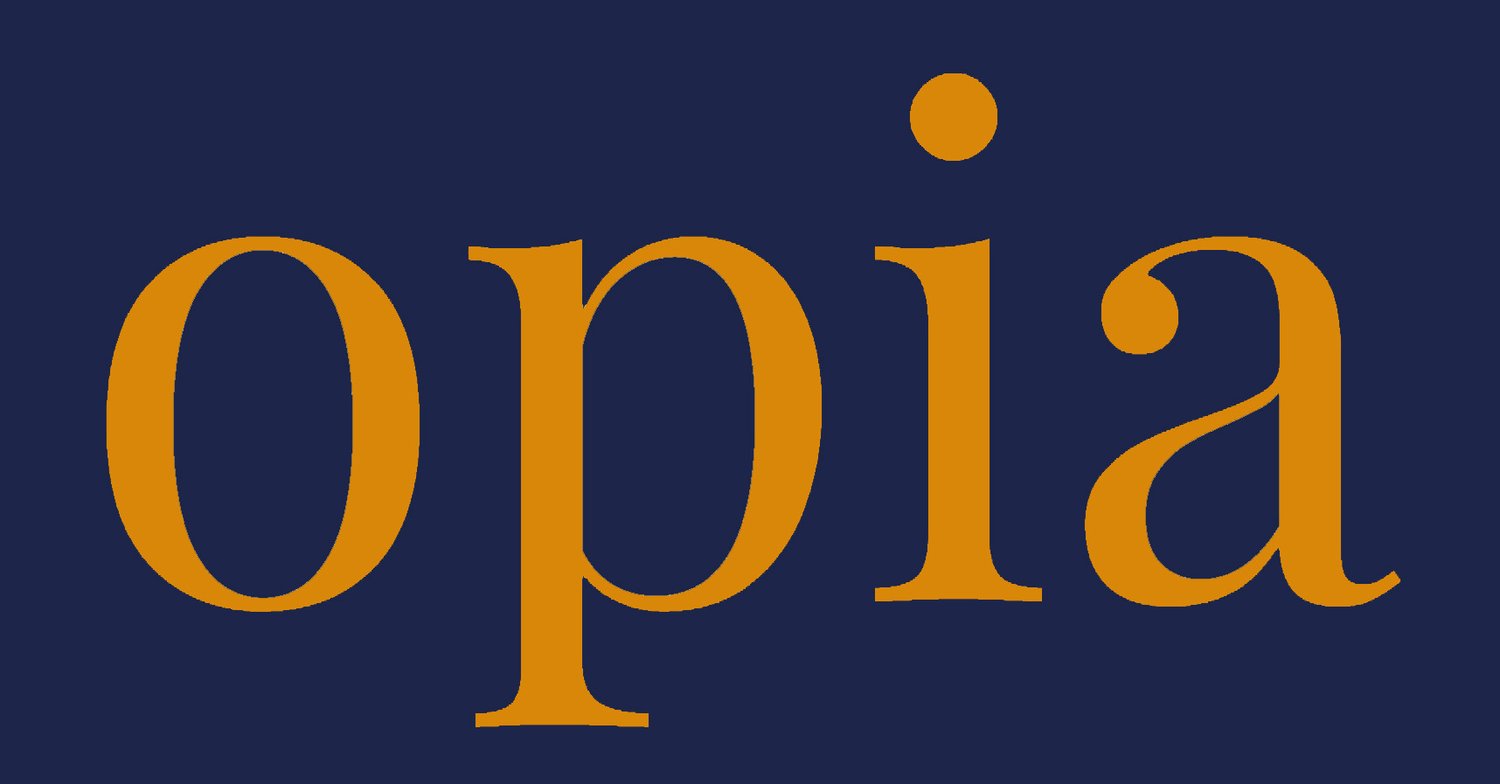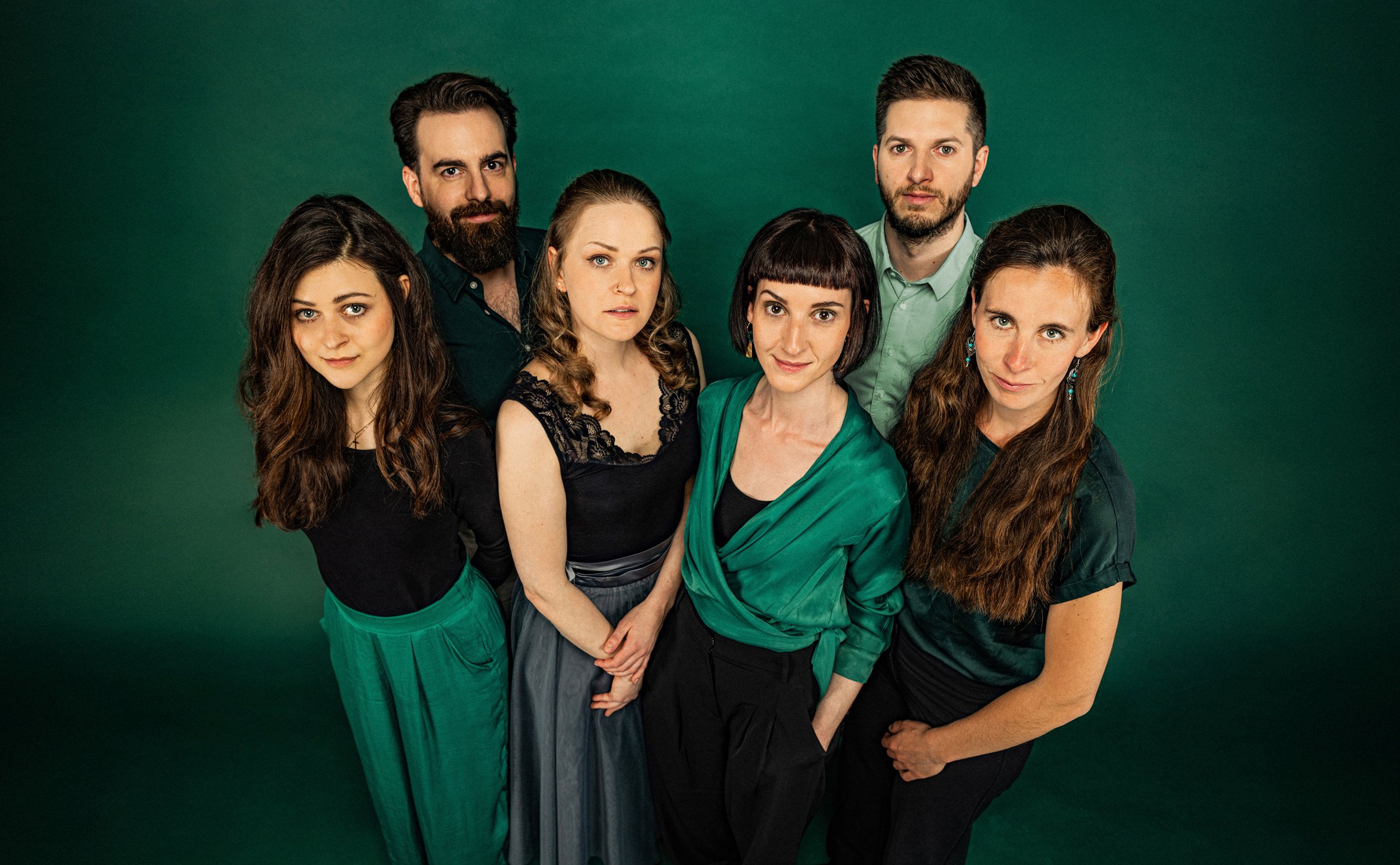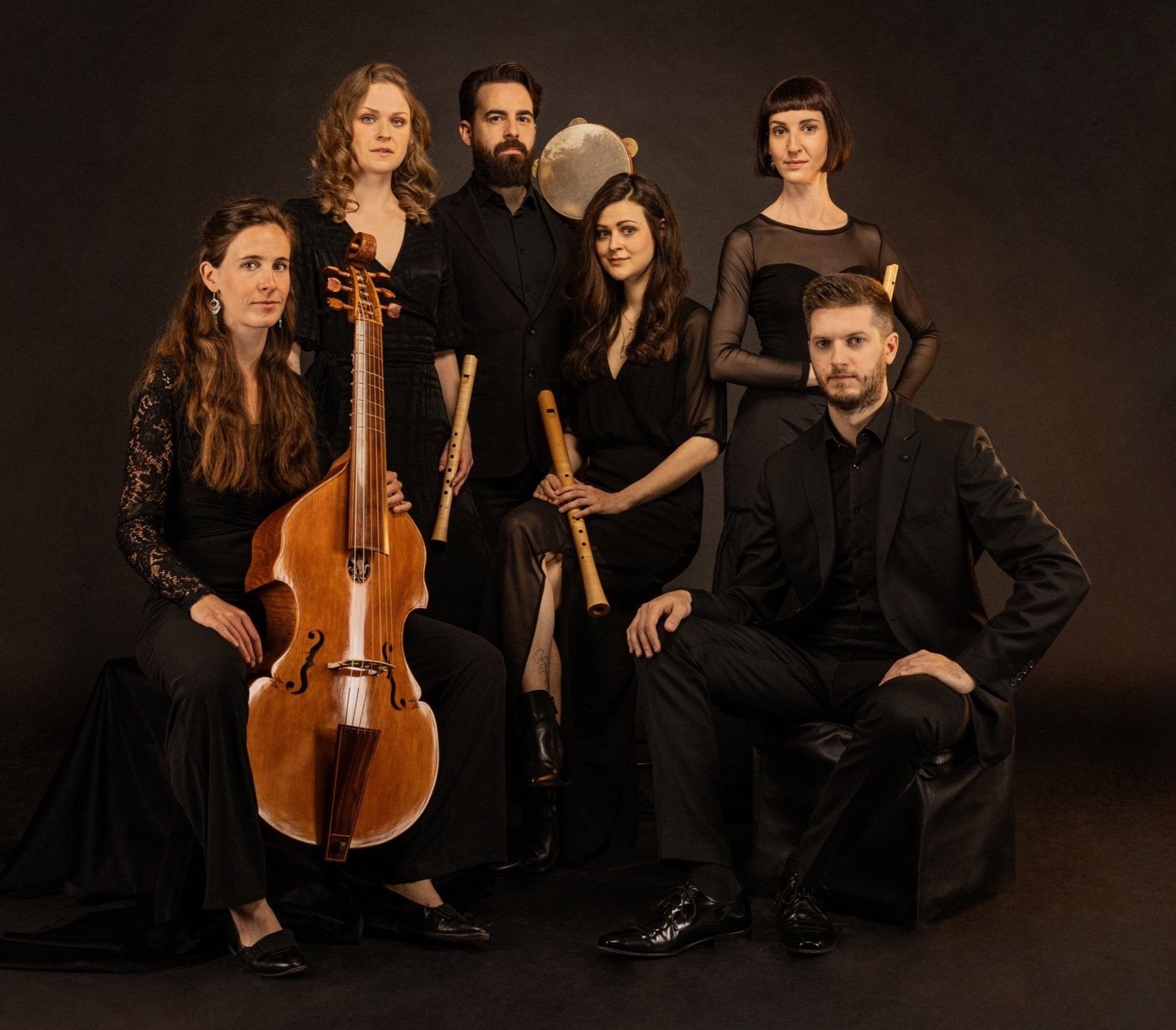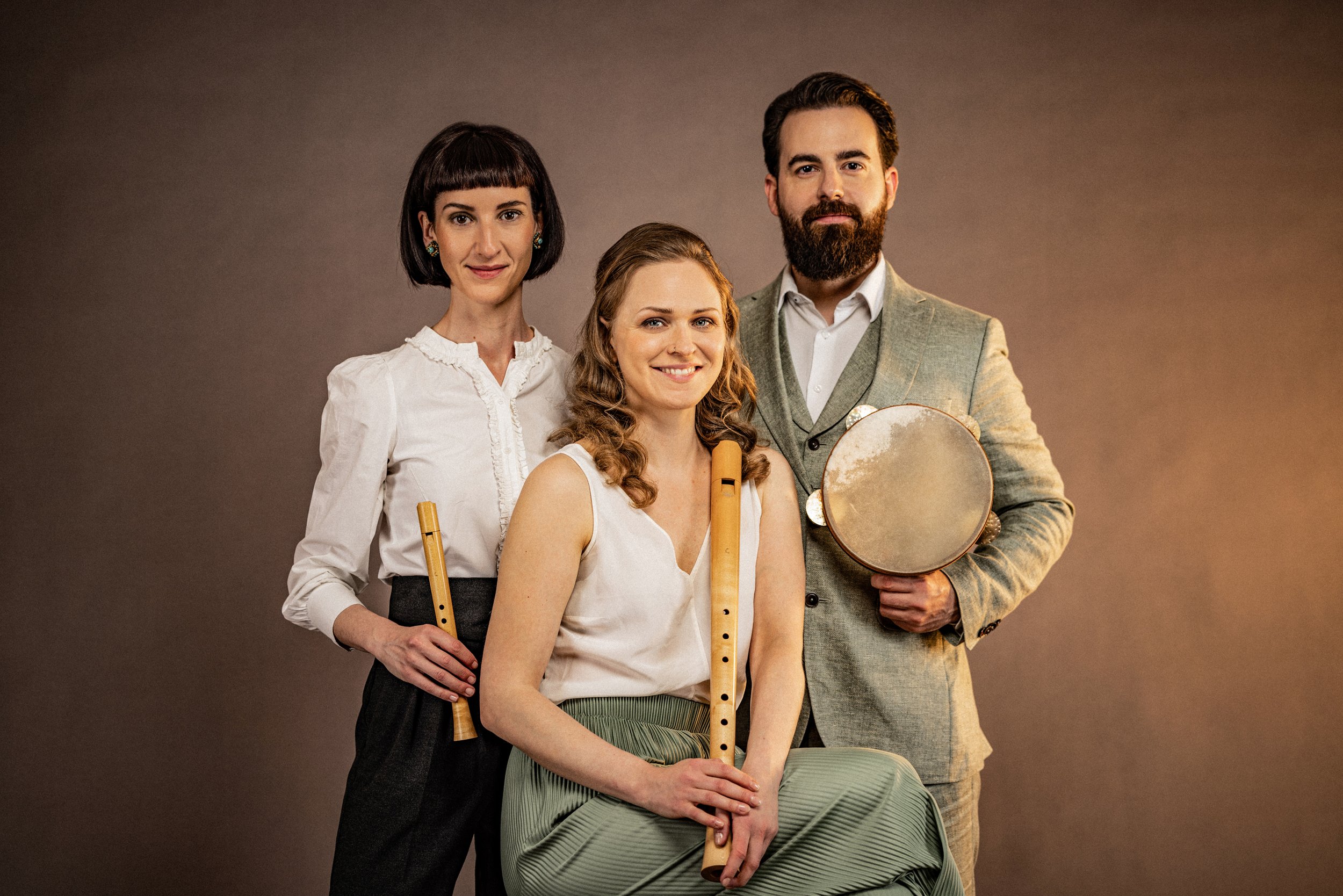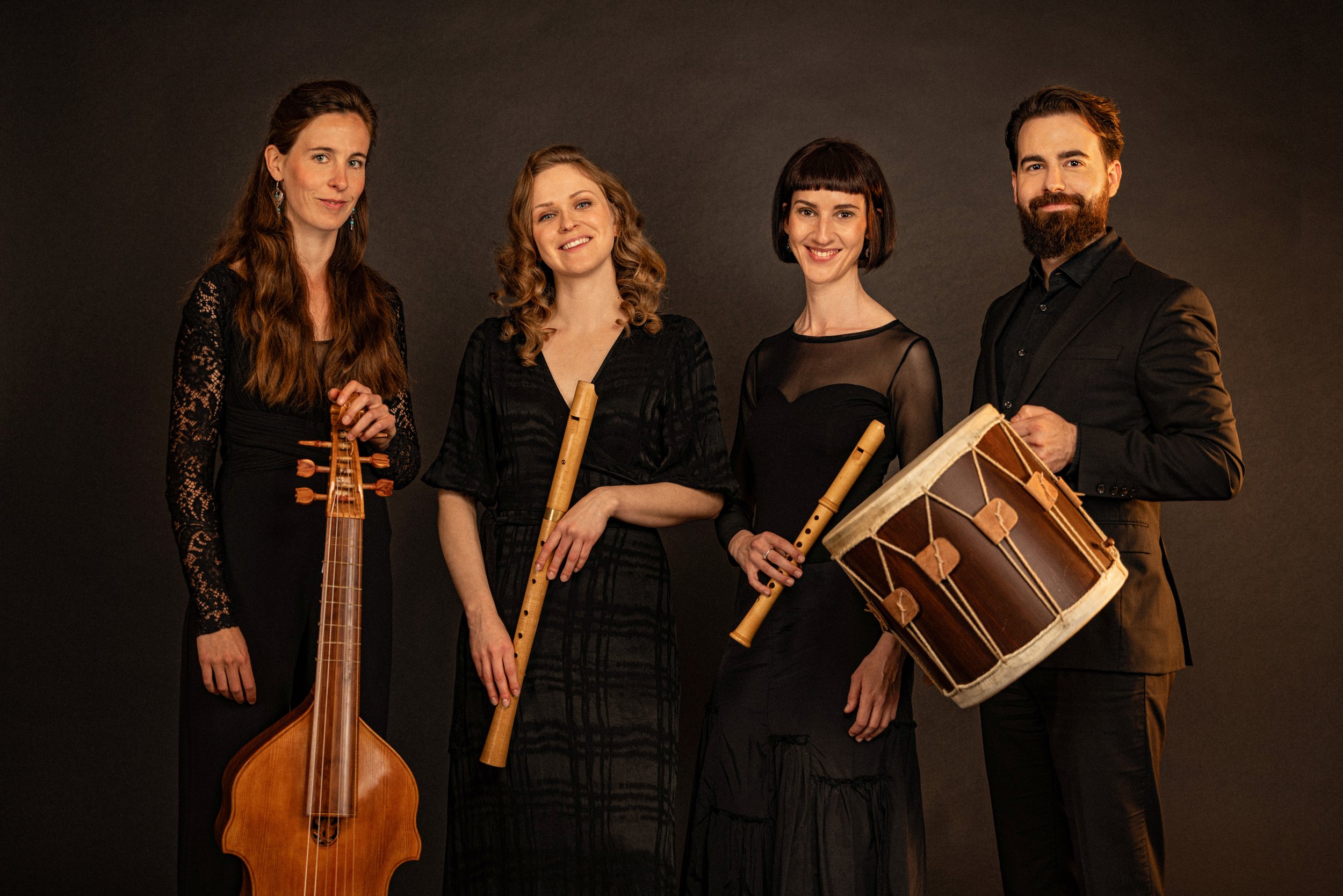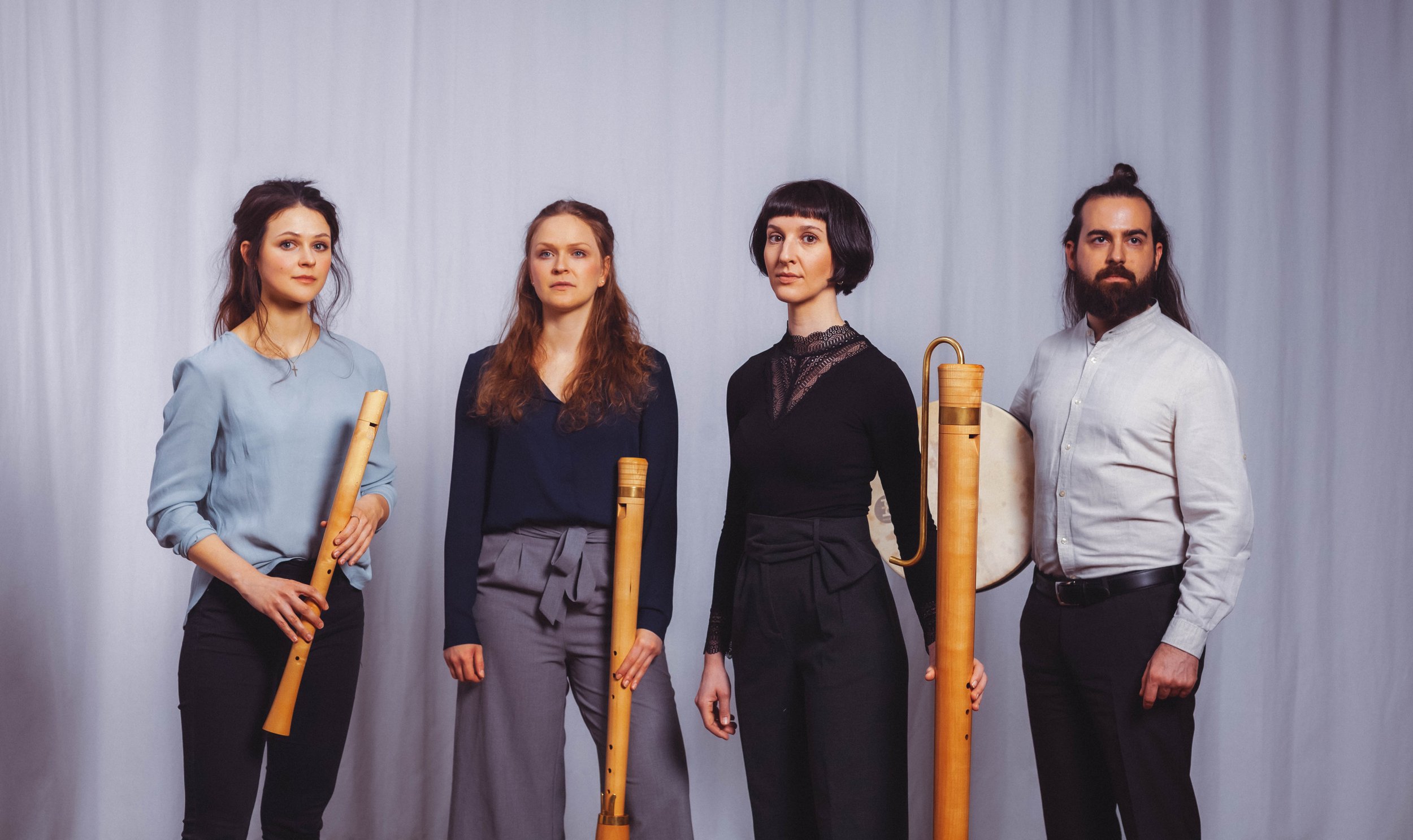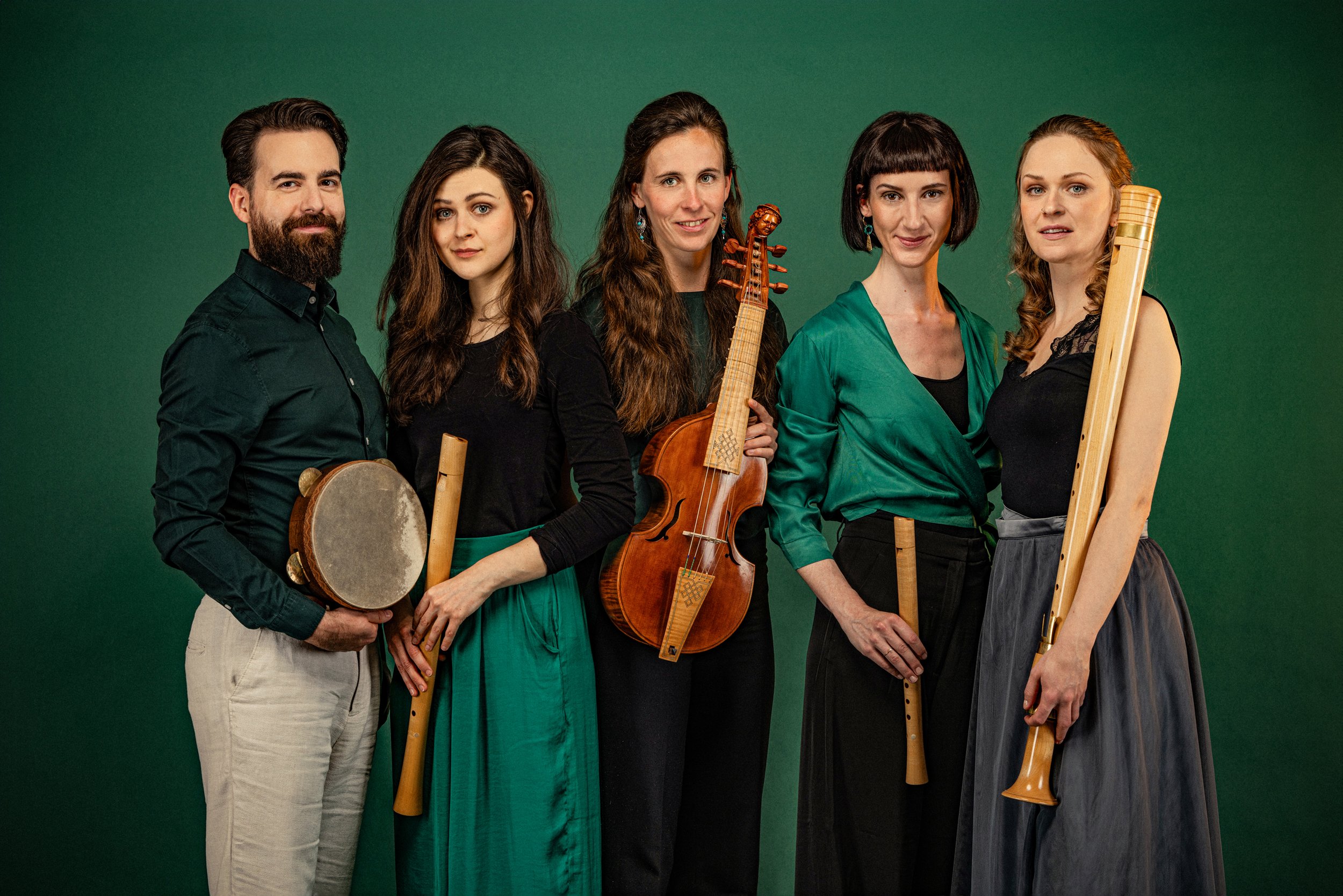Ensemble for contemporary Interpretation of Early Music | Late Middleages – Renaissance – Early Baroque
opia unites 6 musicians in search of tonal diversity, rhythmical finesse and experimental joy - Eva Leonie Fegers, vocals & recorders , Alina Loewenich, recorders, Fabio Kapeller, percussion, Friederike Vollert, recorders, Julia Willeitner, viols and Alexander Gergelyfi, historical keyboard instruments.
After several years of collaboration in various constellations, the musicians Fegers, Loewenich and Kapeller founded the ensemble in spring 2019, the musicians Alexander Gergelyfi, Friederike Volkert and Julia Willeitner then joined the consort.
In the founding year, they had already reached the final of the Tel Aviv Recorder Competition (ISR). In July they won the 2nd Prize at the Concorso di Musica Antica "Maurizio Pratola ", L'Aquila (ITA). The CD production as you like it. was awarded an art grant during the 2022 Bank Austria Crowdfunding. The CD was released in 2023 by ArsProduktion.
opia has performed in Austria, Germany, Italy and Israel and has appeared at renowned festivals such as the Grafenegg Festival (AUT), the Innsbruck Early Music Festival (AUT), the Serenades of the Brucknerhaus Linz (AUT), the Shakespeare Festival at the Globe Theater Neuss (DEU) and the Hohenloher Kultursommer (DEU). The musicians have also taken part in several productions for the radio stations Ö1 and BR-Klassik.
Their CD production as you like it. was supported by the webakemit. and Bank Austria Crowdfunding in 2022. The CD was released by ARS Produktion in 2023.
The focus of the ensemble is on the lively interpretation, recomposition and improvisation of music from the Late Middle Ages, the Renaissance and the Early Baroque.
watch
as you like it. Trailer
{Video & Sound: Agafia Popwska, Live in Concert, Brotfabrik Bonn, May 2025}
Thomas Ravenscroft (1582-1635): A Round of Three Country Dances in One
{Video: Agafia Popowska, Sound: Jonas Beck, Passau, January 2025}
Claudio Monteverdi (1567-1643) Sì dolce è'l tormento from: Quatro Scherzo delle Ariose Vaghezza Venice: Alessandro Vincenti, 1624 Arrangement: opia
{Video: Maria Otter, Sound: Stefan Schweiger}
lullay. Trailer
{Video & Sound by Agafia Popowska; Live in Concert, Linz, January 2025}
Ξ xi Trailer
{Video & Sound: Agafia Popowska; Live in Concert, Brotfabrik Bonn, February 2025}
as you like it. Imagevideo
"After an intense listening session, this album reveals itself to be more than just a multifaceted piece of work — Shakespeare's phrase 'All the world’s a stage' fits perfectly. Emotions and settings shift rapidly throughout the selection of tracks. Everything is transformation. Everything is imagination. Everything is possible – and much of it revolves around love."
— VERA MARZINSKI, ORCHESTERGRABEN, 20.3.2024
„Five stars: A phenomenal release: carefully planned, brilliantly recorded, and impeccably executed.“
— COLIN CLARKE, FANFARE MAGAZINE, 02/2024
"opia manages in an impressive way to do justice to both the past — from which their music and instruments originate — and the present, without creating any imbalance. With their art, opia has achieved a more than complex, yet thoroughly convincing balancing act between yesterday and today."
— ANAIS MUSCHTER, KONZERTREZENSION SHAKESPEARE-FESTIVAL NEUSS, RHEINISCHE POST, 21.05.2024
members
Eva Leonie Fegers
Eva Leonie Fegers is a musician living and working in Vienna and Eisenstadt – recorder and renaissance transverse flute player,
singer, music teacher and artistically creative artist.
Alina Loewenich
Alina Loewenich is a musician, recorder player, and (theatre) performer. Based in Bonn, she works as an interdisciplinary artist on a wide range of projects.
Fabio Kapeller
Fabio Kapeller is a percussionist and project manager based in Vienna, Austria.
Friederike Vollert
Friederike Vollert is a recorder player - living and teaching in Regensburg, traveling around as a soloist and a passionate ensemble player
Julia Willeitner
Julia Willeitner is a gamba and cello player from Passau, where she lives in a wooden hut and, in addition to early music, often makes a detour into South American folk music. At opia she devotes herself entirely to the viols, both small and large.
Alexander Gergelyfi
Alexander Gergelyfi, historical keyboards player, is living and working in Vienna and Graz.
impressions
programmes
as you like it.
As you like it – humorously, sensually, dramatically.
Opia delves into the musical depths of this game - blending literature from the late Middle Ages through the Renaissance to the early Baroque.
In this atmospheric program, the musicians interpret sensual songs and lively dances with singing, recorders, viol, harpsichord and percussion instruments. In different formations, they vary the timbres from intimate to splendid chamber music.
Inspired by Shakespeare's comedy of mistaken identity, we also move musically between the worlds: We discover the savoir vivre at the French court, hurry to the convivial Viennese tavern, flee from the plague into the warm embrace of English melancholy, overcome deep rivers in the solitude of the German forest, feel the mild Italian west wind on our skin and dream of great love on the Spanish coast at night. The ears are buzzing, the head is wondering: Is it the original, an adaptation or is it something we wrote ourselves? Who knows, who knows…
lullay.
Christmas time is the time for songs: the warm sound of music conveys a sense of security.
Songs with gentle melodies, repetitive motifs that soothe the child to sleep. The tradition of the lullaby can be found in all cultures - we can therefore assume that Mary and Joseph also sang songs to their newborn son at the crib: Out of love and care, perhaps to alleviate fear and also pain.
We know that the shepherds and angels also made music: songs of praise and joyful, solemn sounds about the arrival of God on earth. God who became man to redeem us: The miracle of Jesus' birth.
In lullay. you can hear works from the Advent and Christmas season that tell of intimacy, hope and immeasurable joy. Vocal and instrumental music that invites you to contemplate, to rest, but also to celebrate the incarnation of God and the magic of life.
opia interprets old songs by anonymous composers in traditional or original settings, including compositions by Michael Praetorius, Biagio Marini, Johann J. Froberger, Samuel Scheidt and William Byrd.
Eva Leonie Fegers – recorder & vocals
Alina Loewenich – recorder & recitation
Friederike Vollert – recorder
Julia Willeitner – viol
Alexander Gergelyfi – harpsichord
Fabio Kapeller – percussion
Ξ xi
With Ξ xi, three musicians embark on the exciting, experimental sound world and improvisational music practice of the 14th century. During the time of the Ars nova in France, the development of polyphony and a complex notation practice took place as well as artistic song forms such as Ballade, Rondeau and Virelai evolved - all of them complex and expressive compositions.
A similar development can be seen around the time in Italy. Popular secular genres are usually associated with stylized themes: in the Caccia hunting scenes are set to sound, in the Ballata one can listen to poetry and in the Madrigal, shepherd idylls, love, suffering and morality are melodized.
There are compositions by Landini, da Bologna, da Firenze a.o.
Eva Leonie Fegers – recorder & vocals
Alina Loewenich – recorder
Fabio Kapeller – percussion
ad astra
Songs of love can be heard right up to the starry sky - portraying joy and pain, desire and despair, intimacy and rejection.
Musically, we are located in the Italian cultural centers of the 16th century: Rome, Milan, Naples and Venice. Melancholic and humorous songs as well as swinging dances give us an impression of a human being and his search for love.
With recorders, vocals, viola da gamba and percussion, opia interprets works by Fattorin da Reggio, Vincenzo Ruffo, Giovanni da Nola a.o.
anima mea
The soul unites the variety of all emotions and the spiritual processes. During the Middle Ages and the Renaissance, the existence of the soul, which according to the view also controlled physical processes, was assigned not only to humans but to all living beings.
The anima mea program combines French and Italian vocal and instrumental music from the 14th to the 16th century - the Ars nova, the Trecento and the Renaissance. From the development of polyphonic music to complex counterpoint. Instrumented, arranged and reconstructed for vocals, recorders, fiddle, viola da gamba and percussion. There are compositions by Machaut, Landini, da Nola, Scotto and others.
Eva Leonie Fegers – recorder & vocals
Alina Loewenich – recorder & recitation
Julia Willeitner – viol
Fabio Kapeller – percussion
l’amour fou
The songs are as unpredictable and diverse as love itself.
The program focuses on French Renaissance chansons - interpreted with recorders, vocals and percussion. The works revolve around the theme of love and the different emotional states of the lovers: hope and disappointment, bliss and despair, desire and contempt only reflect a fraction, portrayed by secular compositions from the Franco-Flemish school. In this, the polyphonic and complex contrapuntal compositions of the 15th and 16th centuries experienced an enormous development - the emotional, direct expression though was never lost.
opia plays works by Alexander Agricola, Antoine Brumel, Nicolai Gombert, Josquin Desprez a.o.
Eva Leonie Fegers – recorder & vocals
Alina Loewenich – recorder
Friederike Vollert – recorder
Fabio Kapelle – percussion
sonder
sonder { /ˈsɑndɚ/ } looks at the encounter: the moment when we look at each other and recognize the other person as a valuable, multifaceted individual. The moment of encounter carries with it the possibility of creating intimacy and connection from a fleeting moment - touching experiences that leave traces in our own lives and broaden our perspective on life and people.
In sonder, the complex lives, cultures and emotions are explored through sound. The musicians, with their personal stories and individual sound languages, enter the moment of encounter and connect in the compositions through singing, recorders, Viola da gamba and percussion.
Works by John Dowland, Cipriano de Rore, Diego Ortiz, Luca Marenzio, Jakob Arcadelt and Anonymous will be heard.
Eva Leonie Fegers – recorder & vocals
Alina Loewenich – recorder
Friederike Vollert – recorder
Julia Willeitner – viol
Fabio Kapeller – percussion
reviews
„... surprises at its debut appearance in Neunstetten with very modern and freshly interpreted early music from the Middle Ages to the early Baroque ... a self-contained ensemble that, with the wonderful singer, gives the very successful musical evening a very special note.“
„Eva Leonie Fegers excelled on the recorder, the Renaissance transverse flute and with her wonderful singing; Alina Loewenich fascinated the audience with her beautiful recorder playing; Magdalena Kelz played the viol with inspiration and enthusiasm; Fabio Kapeller shone with great percussion instruments.“
